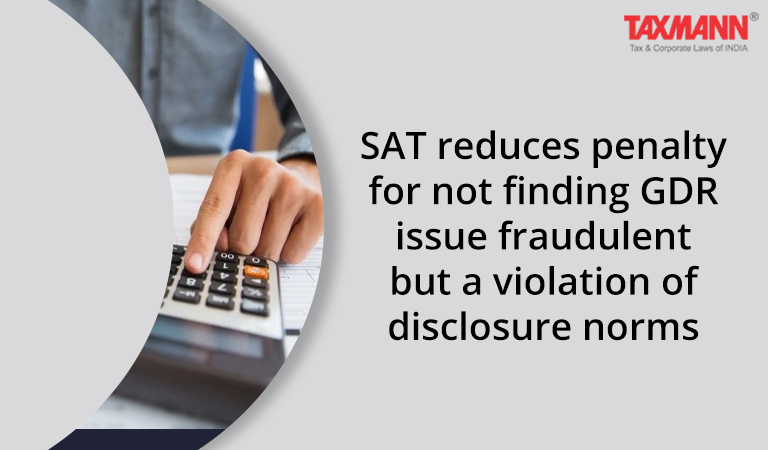SAT reduces penalty for not finding GDR issue fraudulent but a violation of disclosure norms
- Blog|News|Company Law|
- 2 Min Read
- By Taxmann
- |
- Last Updated on 22 November, 2021

Case details: Jaiprakash Kabra v. Securities and Exchange Board of India - [2021] 132 taxmann.com 79 (SAT - Mumbai)
Judiciary and Counsel Details
-
- Justice Tarun Agarwala, Presiding Officer and M.T. Joshi, Judicial Member
- Pritesh Burad and Chinmay Paradkar, Advs. for the Appellant.
- Sharan Jagtiani, Sr. Adv. Ms. Nidhi Singh and Ms. Aditi Palnitkar, Advs. for the Respondent.
- Justice Tarun Agarwala, Presiding Officer and M.T. Joshi, Judicial Member
Facts of the Case
Pursuant to an investigation by SEBI, it was found that company ‘T’ and its directors had issued Global Depository Receipts (GDR) which was subscribed by a single entity, namely, ‘V’. That amount was secured by ‘V’ by obtaining credit from EURAM Bank.
However, company T had pledged its entire GDR proceeds to EURAM Bank as a security against loan availed by ‘V’ for subscribing to GDR. The investigation also revealed that the company had not disclosed to the Stock Exchange the material information that EURAM bank was authorized to use proceeds in connection with a loan and that execution of loan agreement and pledge agreement were not disclosed.
The SEBI, on the other hand, came to the conclusion that scheme floated by a company for issuance of GDRs was a fraudulent scheme to mislead the public and investors and thus, by impugned order restrained directors of ‘T’ including appellant from accessing the securities market in any manner for a period of five years and penalty of Rs. 50 lakh had been imposed for violating regulations 3 and 4 of PFUTP Regulations.
It was noted that the company was now under liquidation and the loan taken by ‘V’ had been repaid, which showed that the GDRs issue made by the company was not fraudulent. Further, proceeds of GDRs had not been diverted to any third party and there was nothing on record to indicate any unfair advantages made by appellants nor anything had come on record to show any loss suffered by investors. Thus, there could not be any violation of any fraud or inducement under regulations 3 and 4.
Therefore, while affirming the finding of violation insofar as it related to non-disclosure, a penalty of Rs. 50 lac was to be reduced to Rs. 20 lac and debarment of five years was to be reduced to two years.
Case Review
-
- Adesh Jain v. SEBI [2021] 123 taxmann.com 163/164 SCL 138 (SAT – Mum.) (para 11)
- Adi Cooper v. SEBI [Appeal No. 124 of 2019, dated 5-11-2019] (para 11)
- Govind Das Pasari v. SEBI [2021] 128 taxmann.com 25/166 SCL 452 (SAT – Mum.) (para 11)
- Praful Shah v. SEBI [Appeal No. 389 of 2021, dated 8-6-2021](para 11) followed.
List of Cases Referred to
-
- Chromatic India Ltd. v. SEBI [Appeal No. 393 of 2020, 12-5-2021] (para 9)
- Mohandas Shenoy Adige v. SEBI [Appeal No. 511 of 2020, dated 28-7-2021] (para 9)
- Adesh Jain v. SEBI [2021] 123 taxmann.com 163/164 SCL 138 (SAT – Mum.) (para 11)
- Adi Cooper v. SEBI [Appeal No. 124 of 2019, dated 5-11-2019] (para 11)
- Govind Das Pasari v. SEBI [2021] 128 taxmann.com 25/166 SCL 452 (SAT – Mum.) (para 11)
- Praful Shah v. SEBI [Appeal No. 389 of 2021, dated 8-6-2021] (para 11)
Disclaimer: The content/information published on the website is only for general information of the user and shall not be construed as legal advice. While the Taxmann has exercised reasonable efforts to ensure the veracity of information/content published, Taxmann shall be under no liability in any manner whatsoever for incorrect information, if any.

Taxmann Publications has a dedicated in-house Research & Editorial Team. This team consists of a team of Chartered Accountants, Company Secretaries, and Lawyers. This team works under the guidance and supervision of editor-in-chief Mr Rakesh Bhargava.
The Research and Editorial Team is responsible for developing reliable and accurate content for the readers. The team follows the six-sigma approach to achieve the benchmark of zero error in its publications and research platforms. The team ensures that the following publication guidelines are thoroughly followed while developing the content:
- The statutory material is obtained only from the authorized and reliable sources
- All the latest developments in the judicial and legislative fields are covered
- Prepare the analytical write-ups on current, controversial, and important issues to help the readers to understand the concept and its implications
- Every content published by Taxmann is complete, accurate and lucid
- All evidence-based statements are supported with proper reference to Section, Circular No., Notification No. or citations
- The golden rules of grammar, style and consistency are thoroughly followed
- Font and size that’s easy to read and remain consistent across all imprint and digital publications are applied



 CA | CS | CMA
CA | CS | CMA
